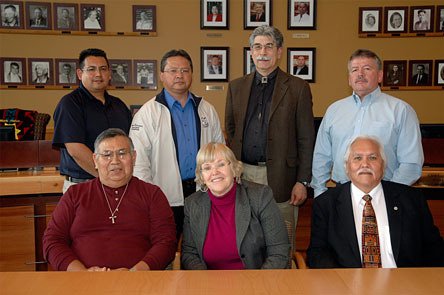TULALIP — Although U.S. Secretary of Labor Hilda Solis was unable to make her scheduled visit to the Tulalip Tribes, Assistant Secretary Jane Oates sat down with the Tribal Board of Directors April 6, in a meeting that both sides hailed as unprecedented.
As Solis addressed to the consequences of the April 5 coal mine disaster in West Virginia, Oates congratulated Tulalip Tribal Board Chair Mel Sheldon Jr. and Board members Glen Gobin, Don Hatch Jr. and Mark Hatch for the Tribes’ successes in labor agreements and ensuring employment opportunities for Tribal members.
“You are the gold — actually, the platinum standard in this area,” Oates said, before joking, “You are the salmon standard.”
As Oates and the Tribal members reflected on Tribal construction projects dating back to the Tulalip Resort Casino, Oates praised the Tribes for their “resilience,” which she said made the difference between the Tulalip Tribes’ progress and other groups’ lack of the same.
Sheldon credited Gobin with helping facilitate the construction process, while Gobin claimed that much of it was simply attributable to having “the right people at the right time under the right conditions,” in order to develop arrangements that have respected Tribal sovereignty and afforded Tribal members broader options.
“They weren’t just token Indians,” said Gobin, who explained that many Tribal members hesitated to join the unions because they didn’t want to leave the Tulalip reservation, so the Tribes worked out a deal for the unions to receive small fees, with the rest going into health care and retirement packages for those Tribal workers. “They’re willing to go to work.”
As Gobin described how Tribal programs have provided college credits and on-the-job training for construction in the field, Oates deemed the Tribes “role models” for their efforts.
“Projects like this facility have applied your knowledge to a 21st century context,” Oates said of the Tulalip Tribes administration building. “Your Tribal members are going to remember their fathers and grandfathers and uncles being part of it, and it’s amazing.”
Gobin and Sheldon cited former Tulalip Tribal Board member Stan Jones Sr. and the Colville Tribes as inspirations to the Tulalip Tribes in the pursuit of construction projects. John Stensgar, the Colville Business Council vice chair who was present at the Tulalip Tribes’ meeting with Oates, claimed that the tables had turned, “and now Tulalip is ahead, while we’re catching up.”
Gobin expressed concerns about the Department of Labor treating all tribes as though they’re at the same stage of progress, pointing out that each tribe has its own unique strengths and shortfalls as individual sovereigns, and Oates pledged to discuss those differences in ways that would foster different relationships than tribes had with the Department of Labor under the previous administration.
“We just appreciate that you’re talking to us,” Don Hatch said. “We never had a Secretary of Labor look at what we were doing and ask us, ‘So, how did you get here?'”



